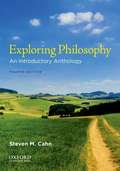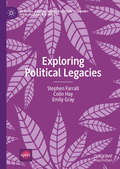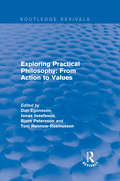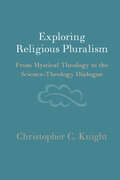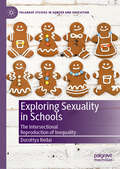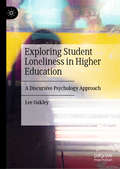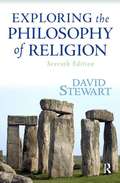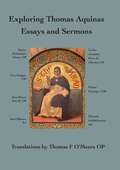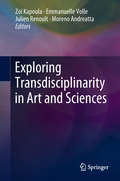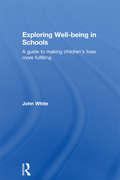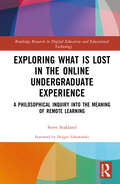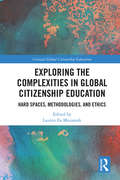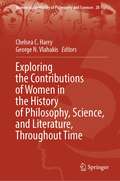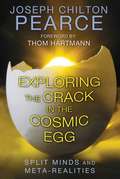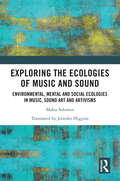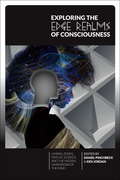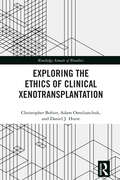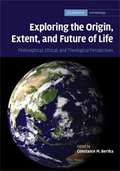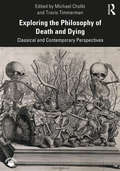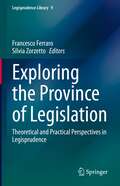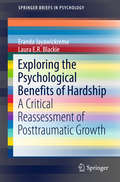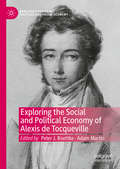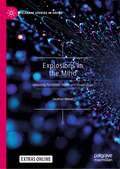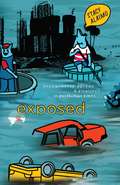- Table View
- List View
Exploring Philosophy: An Introductory Anthology (Fourth Edition)
by Steven M. CahnExtensively revised and expanded in this fourth edition, Exploring Philosophy: An Introductory Anthology is a uniquely accessible and engaging introduction to philosophy. Steven M. Cahn brings together exceptionally clear recent essays by noted philosophers and supplements them with influential historical sources. Most importantly, the articles have been carefully edited to make them understandable to every reader. The topics are drawn from across the major fields of philosophy and include knowledge and skepticism, mind and body, freedom and determinism, the existence of God, identity and immortality, ethical reasoning, abortion, euthanasia, world hunger, democracy, social justice, art, and life and death. The readings are enhanced by concise introductions, study questions, explanatory notes, and suggestions for further reading.
Exploring Political Legacies (Building a Sustainable Political Economy: SPERI Research & Policy)
by Emily Gray Colin Hay Stephen FarrallThe concept of the political legacy, despite its importance for institutionalist and historically-minded political analysts more generally, remains both elusive and undeveloped theoretically. This book seeks to address that oversight by building on existing studies which have approached the notion of a legacy to offer a clear definition and operationalisation of the term which might be used to inform future research. Legacies we view as traces of the past in the present; the claim to the existence of a legacy is both a causal and a counter-factual claim. We propose, in the light of this, a multi-dimensional approach to gauging political legacies, reflecting on some of the theoretical, analytical and methodological concerns which need to be addressed in establishing credible claims to their existence. These we develop and illustrate with respect to the literature on Thatcherism.
Exploring Practical Philosophy: From Action To Values (Routledge Revivals)
by Dan Egonsson Jonas Josefsson Toni Rønnow-RasmussenThis title was first published in 28/11/2001: The broad label ’practical philosophy’ brings together such topics as ethics and metaethics as well as philosophy of law, society, art and religion. In practical philosophy, theory of value and action is basic, and woven into our understanding of all practical and ethical reasoning. New essays from leading international philosophers illustrate that substantial results in the subdisciplines of practical philosophy require insights into its core issues: the nature of actions, persons, values and reasons. This anthology is published in honour of Ingmar Persson on his fiftieth birthday.
Exploring Religious Pluralism: From Mystical Theology to the Science-Theology Dialogue
by Christopher C. KnightHow can we more deeply understand religious pluralism? In this study, Christopher C. Knight suggests that current explorations of religious pluralism may be supplemented by combining new thinking about divine action with the kind of 'mystical theology' that sees doctrinal statements as aids to contemplation rather than as philosophical truth claims. While Knight sees the 'perennialist' tradition of pluralistic thinking as deeply flawed, he nevertheless proposes that we can adopt a kind of neo-perennialism in which the supposed incompatibilities of different faith traditions may still be seen in the way that perennialists have usually considered them: as relating only to the exotericdimension of religious faith and practice. In this way, he suggests, the perennialist notion of esoteric ecumenism may still be valid. He cautions, nevertheless, that at a methodological level, there may be defensible reasons to hesitate before adopting a full-blown pluralism of this kind.
Exploring Sexuality in Schools: The Intersectional Reproduction of Inequality (Palgrave Studies in Gender and Education)
by Dorottya RédaiThis book explores the place of sexuality in a Hungarian vocational school. Building upon ethnographic research using a post-structuralist and intersectional theoretical framework, the author highlights the voices of teachers and students in their everyday environment and gives them the opportunity to speak about themselves and their experiences: in doing so, addressing a significant gap in the market. The author critically discusses key issues concerning schooling and sexuality, addressing such themes as LGBTQ+ youth and teachers, institutional hierarchy, and the role of sexuality in the re/production of social inequalities through education. Through these topics, she sensitively questions what should be expected of schools in preparing their students for the wider world. The intersectional approach employed by the author will appeal to scholars in a wide variety of disciplines, from gender and sexuality studies to the sociology of education and race and ethnicity studies.
Exploring Student Loneliness in Higher Education: A Discursive Psychology Approach
by Lee OakleyThis book is an in-depth qualitative linguistic study of loneliness disclosures in interviews with undergraduate students in the UK. While much loneliness research has been undertaken in the areas of psychology, social policy and education, such studies have prioritised the social factors behind mental distress without paying explicit attention to the medium in which such distress is communicated and embodied (i.e. language). This monograph supplements this growing body of work by arguing for a stronger focus on the insights which linguistic analysis can provide for investigating how and why loneliness is disclosed by Higher Education students. This book is the first study to address discourses of loneliness in Higher Education specifically from a linguistic perspective, and will be of interest to education and healthcare professionals, counselling and welfare providers, and students and scholars of discourse analysis and linguistics.
Exploring The Limits of The Human Through Science Fiction
by Gerald Alva MillerThrough its engagement with different kinds of texts, Exploring the Limits of the Human through Science Fiction represents a new way of approaching both science fiction and critical theory, and its uses both to question what it means to be human in digital era.
Exploring The Philosophy Of Religion
by David StewartExploring the Philosophy of Religion, 7th Edition, combines the best features of a text and a reader by offering clear analysis coupled with important primary-source readings. Professor David Stewart called upon his 30-plus years of teaching experience to introduce students to the important study of philosophical issues raised by religion. Beginning students often find primary sources alone too difficult so this text offers primary source materials by a variety of significant philosophers--including a balanced blend of classical and contemporary authors--but the materials are supported by clearly written introductions, which better prepare students to understand the readings.
Exploring Thomas Aquinas: Essays and Sermons
by Atf Press2023 marked 700 years since Aquinas' canonisation, 2024 marks the 750th anniversary of his death and 2025 the 800th anniversary of his birth. The following essays and sermons present interpreters of Aquinas in the twentieth century who are transmitting and applying his insights.
Exploring Transdisciplinarity in Art and Sciences
by Zoï Kapoula Emmanuelle Volle Julien Renoult Moreno AndreattaThe book is organized around 4 sections. The first deals with the creativity and its neural basis (responsible editor Emmanuelle Volle). The second section concerns the neurophysiology of aesthetics (responsible editor Zoï Kapoula). It covers a large spectrum of different experimental approaches going from architecture, to process of architectural creation and issues of architectural impact on the gesture of the observer. Neurophysiological aspects such as space navigation, gesture, body posture control are involved in the experiments described as well as questions about terminology and valid methodology. The next chapter contains studies on music, mathematics and brain (responsible editor Moreno Andreatta). The final section deals with evolutionary aesthetics (responsible editor Julien Renoult).Chapter "Composing Music from Neuronal Activity: The Spikiss Project" is available open access under a Creative Commons Attribution-NonCommercial 4.0 International License via link.springer.com.
Exploring Well-Being in Schools: A Guide to Making Children's Lives more Fulfilling
by John Peter WhiteCan we teach others how to lead a fulfilling life? The notion of personal well-being has recently shot up the political and educational agendas, placing the child's well-being at the heart of the school’s task. With his renowned talent for distilling the most complex of philosophical arguments into accessible laymen's terms, John White addresses the maze of issues surrounding well-being, bringing clarity to this dissension and confusion. This accessible book expertly guides you through the conflicting perspectives on well-being found in the educational world by * Examining religious and secular views of human fulfilment and of a meaningful life. * Analysing the appeal of celebrity, wealth and consumerism to so many of our children. * Asking what role pleasure, success, autonomy, work, life-planning and worthwhile activities play in children's flourishing. * Showing how proposals to encourage children's well-being impact on schools' aims and learning arrangements. Whether you have little background in education and philosophy or are reading as a teacher, student or policy maker, this engaging book will take you right to the heart of these critical issues. It will leave you with a sharply-focused picture of a remodelled educational system fit for our new millennium, committed to helping every child to enjoy a fulfilling life.
Exploring What is Lost in the Online Undergraduate Experience: A Philosophical Inquiry into the Meaning of Remote Learning (Routledge Research in Digital Education and Educational Technology)
by Steve StaklandThis book examines the significance and meaning of undergraduate online learning using a hermeneutic phenomenological study, asking what is lost when there is no face-to-face contact and exploring the essence of technology itself. Drawing on data from undergraduate students across various higher education institutions, including both interview recordings and written reports of their lived experiences, the author seeks to uncover the essence of the phenomenon by engaging with themes around the philosophy of technology and the purpose of post-secondary education, using Heidegger’s essay The Question Concerning Technology as a crucial interpretive lens. Rather than offering generalized conclusions, it presents a basis for further understanding of the experience of online learning and ultimately asks whether the efficiency afforded to undergraduates by online classes or degrees can ever replace what is learned in a classroom with other people. Providing a novel approach to the topic of online learning, which centers the concept of experience, and drawing links to current conditions and pedagogy in online higher education, it will appeal to scholars working across education and philosophy with interests in higher education, technology and education, phenomenology of education and philosophy of education.
Exploring the Complexities in Global Citizenship Education: Hard Spaces, Methodologies, and Ethics (Critical Global Citizenship Education)
by Lauren MisiaszekWith a focus on the Global South, this book argues that awareness and discussion of the politics of equity and inclusion in global citizenship education (GCE) research are essential to the future of nuanced and effective research in this area. Misiaszek explores the notion of heavily regulated "hard spaces" to examine areas of institutional "blindness" and reflects on ways to negotiate the issue of "sensitivity" in an institutional context, exploring how one’s sensitivity relates to pedagogy and ethics. Through this in-depth meta-discussion of GCE research, Misiaszek provides a complex portrait of unique challenges in this domain and explores the nuanced experience of navigating temporal intersections of the global, the citizen, and education in geographically and thematically-obstacled spaces. This book will be of great interest to researchers, policymakers, academics and postgraduate students in the fields of global education, comparative education, and educational policy.
Exploring the Contributions of Women in the History of Philosophy, Science, and Literature, Throughout Time (Women in the History of Philosophy and Sciences #20)
by Chelsea C. Harry George N. VlahakisThis book explores contributions by some of the most influential women in the history of philosophy, science, and literature. Ranging from Sappho and Sophie Germain to Stebbing and Evelyn Fox Keller, this work ultimately demonstrates the impact these non-canonical, sometimes unknown or hidden, sources had, or may have had, on the recognized male leaders in their fields, from Aristotle to Pascal, Kant, Whitehead, and Russell. Chapters reflect philosophical pluralism, both analytic and continental themes, and cover figures reaching across the entire history of ideas in the West, from pre-historic times to the twentieth century. Anyone interested in coming to know or in preparing to teach women in the history of philosophy, science, and literature will appreciate this collection and its myriad insights into the still unrecognized voices of non-canonical sources across these disciplines.
Exploring the Crack in the Cosmic Egg: Split Minds and Meta-Realities
by Thom Hartmann Joseph Chilton PearceThe classic follow-up to the bestselling The Crack in the Cosmic Egg • Explains the process of acculturation and the mechanisms that create our self-limiting “cosmic egg” of consensus reality • Reveals how our biological development innately creates a “crack” in our cosmic egg--leaving a way to return to the unencumbered consciousness of childhood • Explores ways to discover and explore the “crack” to restore wholeness to our minds and reestablish our ability to create our own realities In this classic follow-up to his bestselling The Crack in the Cosmic Egg, Joseph Chilton Pearce explains the process of acculturation and the mechanisms that create our self-limiting “cosmic egg” of consensus reality. Laying the groundwork for his later classic Magical Child, Pearce shows that we go through early childhood connecting with the world through our senses. With the development of language and the process of acculturation not only do our direct experiences of the world become much less vivid but our innate states of nonordinary consciousness become suppressed. Trapped in a specific cultural context--a “cosmic egg”--we are no longer able to have or even recognize mystical experiences not mediated by the limitations of our culture. Motivated primarily by a fear of death, our enculturation literally splits our minds and prevents us from living fully in the present. Drawing from Carlos Castaneda’s writings about Don Juan and the sense of “body-knowing,” Pearce explores the varieties of nonordinary consciousness that can help us return to the unencumbered consciousness of our infancy. He shows that just as we each create our own cosmic egg of reality through cultural conditioning, we also innately create a “crack” in that egg. Ultimately certain shifts in our biological development take place to offset acculturation, leaving an avenue of return to our primary state. Pearce examines the creation of the “egg” itself and ways to discover its inherent cracks to restore wholeness to our minds, release us from our fear of death, and reestablish our ability to create our own realities through imagination and biological transcendence.
Exploring the Ecologies of Music and Sound: Environmental, Mental and Social Ecologies in Music, Sound Art and Artivisms
by Makis SolomosMakis Solomos explores the ecologies of music and sound, inspired by Felix Guattari, for whom environmental destruction caused by capitalism goes hand in hand with deteriorating ways of living and feeling, and for whom an ecosophical stance, combining various ecological registers, offers a glimpse of emancipation, a position strengthened today by intersectional approaches. Solomos explores environmental, mental and social ecologies through the lens of the history of music and current artivisms – especially in the fields of acoustic ecology, contemporary music and sound art. Several theoretical and analytical debates are put forward, including a theory of sound milieus and the biopolitics of sound; the relationships between music and the living world; soundscape compositions, field recording, ecomusicology, and the creation of sound biotopes; the use of sound and music to violent ends as well as considering the social and political functions of music and the autonomy of art, sonic ecofeminism, degrowth in music, and much more.
Exploring the Edge Realms of Consciousness
by Daniel Pinchbeck Ken JordanA diverse group of authors journey into the fringes of human consciousness, tackling psychic and paranormal phenomena, lucid dreaming, synchronistic encounters, and more. Collected from the online magazine Reality Sandwich, these essays explore regions of the mind often traversed by shamans, mystics, and visionary artists; adjacent and contiguous to our normal waking state, these realms may be encountered in dreams or out-of-body experiences, accessed through meditation or plant medicines, and marked by psychic phenomena and uncanny synchronicities. From demons encountered in sleep paralysis visions to psychic research conducted by the CIA, the seemingly disparate topics covered here congeal to form a larger picture of what these extraordinary states of consciousness might have to tell us about the nature of reality itself.From the Trade Paperback edition.
Exploring the Ethics of Clinical Xenotransplantation (Routledge Annals of Bioethics)
by Daniel J. Hurst Christopher Bobier Adam OmelianchukThis book provides a comprehensive examination of the ethics of xenotransplantation. Due to the global shortage of organs for transplantation, there is increasing interest in cross-species transplantation, or xenotransplantation, among researchers and clinicians. Proponents of xenotransplantation envision a future in which transplantable organs can be safely and efficiently grown in genetically modified pigs. This book provides an overview of the major ethical issues involved in xenotransplantation. Xenotransplantation touches on almost every area of bioethics: animal research, public health, patient selection, allocation, global justice, pediatric research, and informed consent. Each chapter provides a nuanced overview of the positions that have been offered on a specific topic and the authors seek to provide a way forward. Exploring the Ethics of Clinical Xenotransplantation is an essential resource for researchers, students, and clinicians working in bioethics, medical ethics, animal ethics, and public health policy.
Exploring the Origin, Extent, and Future of Life
by Constance M. BertkaWhere did we come from? Are we alone? Where are we going? These are the questions that define the field of astrobiology. New discoveries about life on Earth, the increasing numbers of extrasolar planets being identified, and the technologies being developed to locate and characterize Earth-like planets around other stars are continually challenging our views of nature and our connection to the rest of the universe. In this book, philosophers, historians, ethicists, and theologians provide the perspectives of their fields on the research and discoveries of astrobiology. A valuable resource for graduate students and researchers, the book provides an introduction to astrobiology, and explores subjects such as the implications of current origin of life research, the possible discovery of extraterrestrial microbial life, and the possibility of altering the environment of Mars.
Exploring the Philosophy of Death and Dying: Classical and Contemporary Perspectives
by Michael Cholbi Travis TimmermanExploring the Philosophy of Death and Dying: Classical and Contemporary Perspectives is the first book to offer students the full breadth of philosophical issues that are raised by the end of life. Included are many of the essential voices that have contributed to the philosophy of death and dying throughout history and in contemporary research. The 38 chapters in its nine sections contain classic texts (by authors such as Epicurus, Hume, Nietzsche, and Schopenhauer) and new short argumentative essays, specially commissioned for this volume, by world-leading contemporary experts. Exploring the Philosophy of Death and Dying introduces students to both theoretical issues (whether we can survive death, whether death is truly bad for us, whether immortality would be desirable, etc.) and urgent practical issues (the ethics of suicide, the value of grief, the appropriate medical criteria for declaring death, etc.) raised by human mortality, enabling instructors to adapt it to a wide array of institutions and student audiences. As a pedagogical benefit, PowerPoints, discussion questions, and test questions for each chapter are included as online ancillary materials.
Exploring the Province of Legislation: Theoretical and Practical Perspectives in Legisprudence (Legisprudence Library #9)
by Francesco Ferraro Silvia ZorzettoLegisprudence considers a variety of perspectives and relies on contributions from numerous different disciplines. Rather than providing examples of the various possible approaches to legisprudential studies, this book – bringing together lawyers and legal theorists from seven different countries – highlights two aspects of the many disciplines involved. Firstly, it discusses theoretical abstraction, which borders on, or enters into the realm of full-fledged philosophical speculation. Secondly, it examines empirical observation of specific cases, precisely situated regarding their spatial or historical collocation, or referring to a particular species of legislative policy. Focusing on legislation both as a process and as a result, the aim of the book is twofold: on the one hand, it demonstrates that, far from being a purely theoretical and exclusively academic intellectual enterprise, legisprudence can offer criteria for both assessing and improving the quality of real-world legislation. On the other hand, it shows how lawmaking is at least as interesting and legitimate a field of inquiry as adjudication and interpretation of laws for legal theorists and philosophers of law, and that they are already equipped with extremely valuable intellectual tools for fruitful legisprudential inquiry. The book is organized in two parts. The first part comprises legal-theoretical accounts on general aspects of legislation as a process and as a result. The second part presents contributions focusing on specific experiences of evaluations of legislative quality and contributions to the legislature’s work on the part of the public, as well as on particular legislative policies, methodologies in lawmaking, and problems regarding legislation as an instrument.
Exploring the Psychological Benefits of Hardship
by Eranda Jayawickreme Laura E.R. BlackieCan adversity lead to enduring positive change across the lifespan? Providing a thoughtful and considered exploration of this question, this book presents a critical reassessment of posttraumatic growth, based on correcting prior theoretical and methodological limitations in the current research. Its core argument is that posttraumatic growth should be reconceptualized as positive personality change, and thus should be studied using novel methodological approaches from the field of personality psychology. Broadly, this argument is put forward in five progressive sections. Beginning by giving a conceptual and interdisciplinary overview of posttraumatic growth as a phenomenon, the volume then reviews the current academic conceptualization of posttraumatic growth and makes a case for a 'reset' in the research. The next section maintains that posttraumatic growth is in fact a form of positive personality change and should be analyzed using personality science methodology. Using positive personality change as a theoretical foundation for posttraumatic growth, the following two sections look at posttraumatic growth in context. It is explored both in the long term, such as in the development of reflective knowledge and wisdom, and in specific situations such as with refugees in Sri Lanka and survivors of the Rwandan genocide. Lastly, Exploring the Psychological Benefits of Hardship: A Critical Reassessment of Posttraumatic Growth concludes by offering recommendations for scholars and researchers that will improve the quality of research on posttraumatic growth, and will advance this important and worthy field.
Exploring the Social and Political Economy of Alexis de Tocqueville (Mercatus Studies in Political and Social Economy)
by Adam Martin Peter J. BoettkeAlexis de Tocqueville’s work touched upon an exceptionally broad range of social scientific disciplines, from economics to religion, and from education to international affairs. His work consistently appeals to scholars dismayed by existing disciplinary silos. Tocqueville is also well-regarded for diagnosing both the promise and perils of democratic life. Consideration of his ideas provokes serious consideration of and engagement with contemporary trends as citizens in democratic countries cope with challenges posed by new technological, cultural, and political changes. However, attention to Tocqueville is uneven across disciplines, with political theorists paying him the most heed and economists the least. This volume focuses on political economy, trying to bridge this divide. This book collects essays by emerging scholars from a variety of disciplines—political science, economics, sociology, philosophy, and social thought—to examine Tocqueville’s thoughts on political and social economy and its contemporary relevance. The book is divided into two halves. The first half engages with the main currents of research on Tocqueville’s own thoughts regarding economic institutions, constitutionalism, liberalism, history, and education. The second half applies Tocqueville’s insights to diverse contemporary topics including international relations, citizenship, mass incarceration, and pedagogy. This volume will be of interest to scholars and students interested in Tocqueville, the history of political thought, and a variety of current policy issues.
Explosions in the Mind: Composing Psychedelic Sounds and Visualisations (Palgrave Studies in Sound)
by Jonathan WeinelThis book explores how to compose sounds and visualisations that represent psychedelic hallucinations and experiences of synaesthesia. Through a detailed discussion regarding compositional methodologies and technical approaches, the book aims to educate students, practitioners, and researchers working in related areas. It weaves together sound, visual design, and code across a range of media, providing conceptual approaches, theoretical insights, and practical strategies, which unlock new design frameworks for composing psychedelic sounds and visualisations.
Exposed: Environmental Politics and Pleasures in Posthuman Times
by Stacy AlaimoOpening with the statement &“The anthropocene is no time to set things straight,&” Stacy Alaimo puts forth potent arguments for a material feminist posthumanism in the chapters that follow.From trans-species art and queer animals to naked protesting and scientific accounts of fishy humans, Exposed argues for feminist posthumanism immersed in strange agencies and scale-shifting ethics. Including such divergent topics as landscape art, ocean ecologies, and plastic activism, Alaimo explores our environmental predicaments to better understand feminist occupations of transcorporeal subjectivity.She puts scientists, activists, artists, writers, and theorists in conversation, revealing that the state of the planet in the twenty-first century has radically transformed ethics, politics, and what it means to be human. Ultimately, Exposed calls for an environmental stance in which, rather than operating from an externalized perspective, we think, feel, and act as the very stuff of the world.
